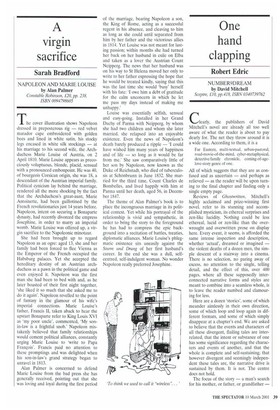A virgin sacrifice
Sarah Bradford
NAPOLEON AND MARIE LOUISE by Alan Palmer Constable Robinson, £20, pp. 238, ISBN 0094798605 The cover illustration shows Napoleon dressed in preposterous rig — red velvet matador cape embroidered with golden bees and lined in white satin, his stocky legs encased in white silk stockings — at his marriage to his second wife, the Archduchess Marie Louise of Austria, on 2 April 1810. Marie Louise appears as precociously voluptuous, blonde, placid, sensual with a pronounced embonpoint. He was 40, of bourgeois Corsican origin, she was 18, a descendant of the Austrian imperial family. Political cynicism lay behind the marriage, rendered all the more shocking by the fact that the Archduchess's great-aunt, Marie Antoinette, had been guillotined by the French revolutionaries just 14 years before. Napoleon, intent on securing a Bonaparte dynasty, had recently divorced the empress Josephine, in order to marry an imperial womb. Marie Louise was offered up, a virgin sacrifice to the Napoleonic minotaur.
She had been brought up to regard Napoleon as an ogre: aged 13, she and her family had been forced to flee Vienna as the Emperor of the French occupied the Habsburg palaces. Yet she accepted the hereditary destiny of an Austrian archduchess as a pawn in the political game and even enjoyed it. Napoleon was the first man she had been to bed with and, as he later boasted of their first night together, 'she liked it so much that she asked me to do it again'. Napoleon revelled to the point of fantasy in the glamour of his wife's imperial connections. Marie Louise's father. Francis II, taken aback to hear the upstart Bonaparte refer to King Louis XVI as 'my poor uncle', commented, 'My sonin-law is a frightful snob.' Napoleon mistakenly believed that family relationships would cement political alliances, constantly urging Marie Louise to 'write to Papa Francois'. Francis paid no attention to these promptings and was delighted when his son-in-law's grand strategy began to unravel in 1813.
Alan Palmer is concerned to defend Marie Louise from the bad press she has generally received, pointing out that she was loving and loyal during the first period
of the marriage, bearing Napoleon a son, the King of Rome, acting as a successful regent in his absence, and cleaving to him as long as she could until separated from him by her father and the victorious allies in 1814. Yet Louise was not meant for lasting passion; within months she had turned her back on her husband in exile on Elba and taken as a lover the Austrian Count Neipperg. The news that her husband was on his way to St Helena moved her only to write to her father expressing the hope that he would be treated kindly, saying that this was the last time she would 'busy' herself with his fate: 'I owe him a debt of gratitude for the calm unconcern in which he let me pass my days instead of making me unhappy.'
Louise was essentially selfish, sensual and easy-going. Installed in her Grand Duchy of Parma with Neipperg, by whom she had two children and whom she later married, she relapsed into an enjoyable existence. Even the news of Napoleon's death barely produced a ripple — 'I could have wished him many years of happiness and of life — so long as it would be far from me.' She saw comparatively little of her son by Napoleon, now known as the Duke of Reichstadt, who died of tuberculosis at Schonbrurin in June 1832. She married for the third time, Count Charles de Bombelles, and lived happily with him at Parma until her death, aged 56, in December 1847.
The theme of Alan Palmer's book is to place the incongruous marriage in its political context. Yet while his portrayal of the relationship is vivid and sympathetic, in order to bring the story to the foreground he has had to compress the epic background into a recitation of battles, treaties, diplomatic alliances. Marie Louise's phlegmatic existence sits uneasily against the Sturm und Drang of her first husband's career. In the end she was a dull, selfcentred, self-indulgent woman. No wonder Napoleon really preferred Josephine.


































































 Previous page
Previous page